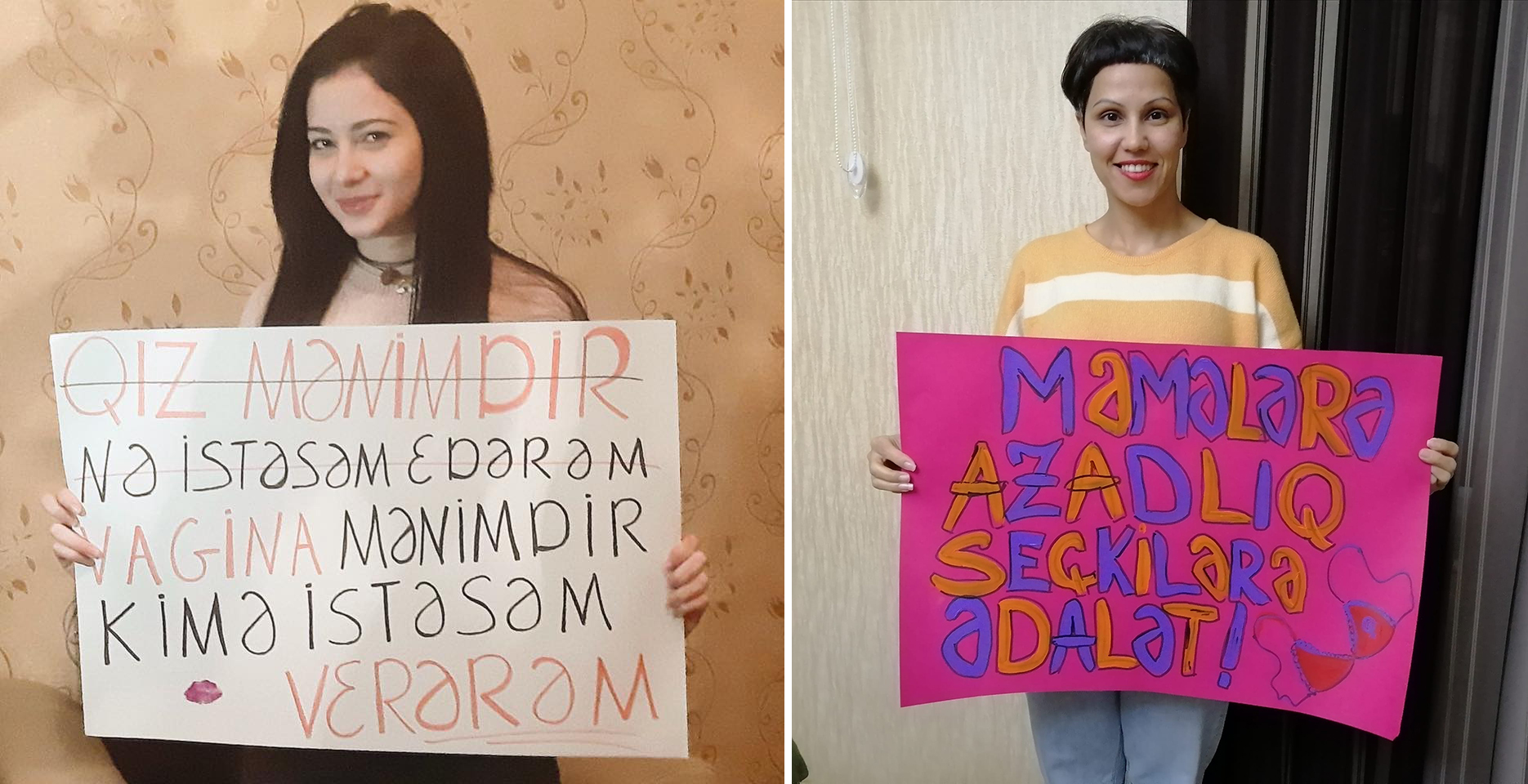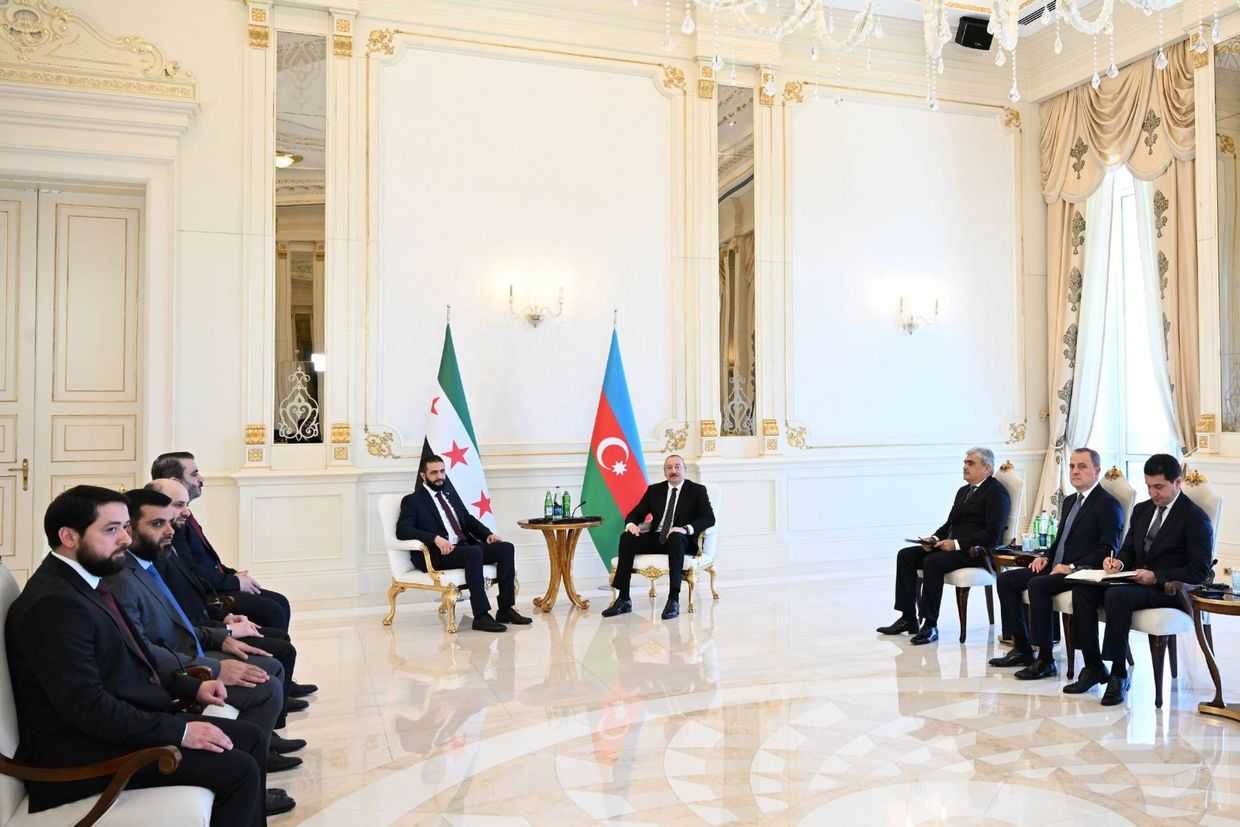
A 23-year-old woman has attempted to take her own life in Azerbaijan after public outcry over her use of the word vagina on a poster demanding women’s rights.
Aysel Alakbarzade attempted to take her own life in Baku in the early hours of Tuesday, according to a joint statement from the General Prosecutor’s Office and the Ministry of Internal Affairs.
Alakbarzade was one of several dozen women to attend a protest on International Women’s Day in Baku.
She held a poster with the slogan ‘The girl is mine. I can do whatever I want with her. My vagina is mine. I can give it to whomever I want’. The poster provoked widespread discussion on social media with many criticising Alakbarzade while some supported her.
[Read more on OC Media: Women’s Day protest goes ahead in Baku despite attempts by police to disperse it]
According to the statement, Alakbarzade was transferred to the Baku Clinical Medical Centre with a broken leg and traumatic brain injury. Her condition remains stable and she is undergoing treatment.
The Yasamal District Prosecutor’s Office and the police have opened a criminal investigation into incitement to suicide.
Several hours before attempting to take her own life, Alakbarzade wrote a post on Facebook accusing journalist Nurlan Gahramanli, his wife Asli Alizade, and another man, Gurban Mammadli, of incitement her to suicide.
In a live broadcast on Facebook on Monday, she said that those three people wrote posts against her on the orders of someone else after she participated in the Women’s Day march.
All three wrote on Facebook on Monday that Alakbarzade had attempted to blackmail them, though Alizade later deleted her post.
The prosecutors’ statement said that a preliminary investigation had revealed that Alakbarzade suffered from the serious public outcry from some social network users because of her poster.
‘At present, an investigation is underway to determine the circle of possible people involved in the suicide attempt of Alakbarzade’, they said.
‘Alakbarzade is a victim of the feminist movement’
Eldar Sultanov, chief spokesperson for the Prosecutor General’s Office, told news agency APA that investigators believed Alakbarzade was a victim of illegal actions by several women’s rights activists.
He said that activists Aslan Hamidli, Nurlan Jafarov [Gahramanli], and Yusif Isayev had been questioned.
Sultanov said they were investigating ‘on whose initiative the provocative slogan was used by Alakbarzade’ and ‘who told Aysel to use it during demonstration’.
He said that the organisers and participants of the rally, along with Rabiyya Mammadova, Narmin Shahmarzade, Khadija Ismayil and others would be questioned.
Alakbarzade told to Alternativ TV on Tuesday that nobody had made her create the poster.
‘I made it myself and by my own will […] My suicide attempt is not connected with this poster’, she said.
Alakbarzade added that no feminist activists mentioned by the General Prosecutor’s office were connected to the incident.
She said that her ‘friends’ Nurlan Gahramanli and his wife Asli Alizade had ‘slandered’ her, adding that they, along with Gurban Mammadli were to blame.
Gahramanli told OC Media that the suicide attempt ‘coincided with an emotional and stressful period of her life’.
‘We all have tough and emotional periods in our lives, but we don’t attempt to kill ourselves. I don’t find myself responsible for her suicide attempt’, he said.
He also told news website Telegraf that Alakbarzade was not stable.
‘She was subjected to various forms of humiliation and public bullying in connection with the 8 March rally. I should not criticise her, I probably offended her.’
‘Before that, we had a small conflict, maybe she thought that I criticised her to take revenge on her. I hope that the guilty will be punished. The culprit is actually society itself’, he said.
Gurban Mammadli wrote on Facebook on Tuesday that he had not been summoned for questioning.
‘Maybe I had something to say? Many people know what kind of person she is, and like many others, I had been blackmailed by her and given money. It is a crime itself. If there is something to be investigated, investigate these cases of fraud’, he wrote.
‘Feminists are perceived by the government as a serious force’
In a statement on Tuesday, the organisers of the 8 March protest said that Alakbarzade was not one of the march’s organisers but joined the rally ‘using her freedom of expression’.
They said that they condemned the actions of anyone who humiliate the honour and dignity of people, violate their rights, and said that such people should be held accountable.
They added that neither they nor other participants of the march were responsible for ‘a group of provocateurs prepared in advance for the action’.
‘Given the fact that government-oriented media (AzTV, Real TV, haqqin.az) have targeted us directly and that one of many slogans [the one on Alakbarzade’s poster] has been deliberately circulated, we conclude that we are perceived by the government as a serious force. Therefore, a serious campaign has been conducted against us’, said the statement.
They noted that all the goals of the march were mentioned in a statement released before it took place.
‘We condemn all the campaigns aimed at keeping [public attention] away from the main objectives of the march’, they said.
Backlash against the poster
Alakbarzade’s poster and one of another participant of the rally that said ‘Freedom to boobs! Justice for elections!’, provoked widespread discussions on social media both before and after the march.

Many criticised the content of the posters with some arguing it was too early for messages of sexual liberation in Azerbaijani society.
Journalist Khadija Ismayil wrote on Facebook on Friday that ‘it is unreasonable to make something kitsch using sex and this has nothing to do with the fight for equality’.
‘We have been fighting for privacy and not bringing this issue to public discussion for years, and now you declare these issues open for public discussion?’, she wrote.
Ali Karimli, leader of the opposition Popular Front Party, commented on Sunday that he was ‘sorry to hear that today there were several unethical slogans against public morality’.
‘Of course, not only do I not uphold those unethical slogans, I consider such slogans to be a violation of public morality, and I think it is harmful’ he said.
Yadigar Sadigli, a member of the Executive Board of the opposition Musavat Party, wrote on Facebook on Sunday that the slogan was ‘shallow’.
The slogans also divided opinions among feminists in Azerbaijan.
Mehriban Zeynalova, the head of the Clean World Social Union, a local NGO dealing with women’s rights, wrote on Facebook on Sunday that ‘if today’s action was against violence against women, the posters were calling for violence, but if it was against stereotypes, it could be rephrased in other ways’.
Shahla Ismayil, the chair of the Women’s Association for Rational Development, a Baku-based NGO, wrote on Facebook on Sunday that some slogans ‘pulled some of us out of our comfort zone at great speed’.
‘They are not suitable for an Azerbaijani woman, who has perhaps for decades been a symbol of decency and morality, trying to protect her family at any cost. That’s why I understand the anger of those who claim to be progressive’, she wrote.
Gulnara Mehdiyeva, one of the march’s organisers, told OC Media that ‘a feminist can never tell another feminist: “don’t write the word ‘vagina’ on your poster” ’.
‘In Azerbaijan, only feminists openly talk about the vagina and intervention into sexual life. If we don’t talk about it, then who will?’, she said.
According to her, every woman should write on her poster about the problem she is worried about. ‘The march is a platform, where all the women can express themselves. A mother wrote about one thing, a student about another, and an abused woman about a third thing. This is natural’, she said.







